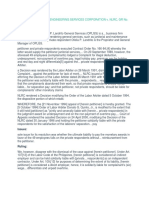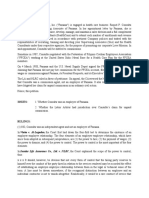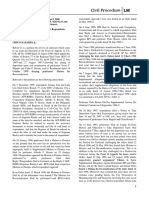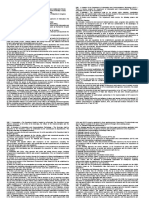TAPE vs. Servana
TAPE vs. Servana
Uploaded by
Loren MandaCopyright:
Available Formats
TAPE vs. Servana
TAPE vs. Servana
Uploaded by
Loren MandaOriginal Description:
Copyright
Available Formats
Share this document
Did you find this document useful?
Is this content inappropriate?
Copyright:
Available Formats
TAPE vs. Servana
TAPE vs. Servana
Uploaded by
Loren MandaCopyright:
Available Formats
12) Televisions and Production Exponents, Inc. (TAPE, Inc.) vs.
Roberto Servaa
G.R. No. 167648 January 28, 2008
TINGA, J.:
Doctrine: There is an employer-employee relationship when the person for whom the services
are performed reserves the right to control not only the end achieved but also the manner and
means used to achieve that end.
FACTS: TAPE is a domestic corporation engaged in the production of television programs while
Antonio Tuviera serves as its president. Roberto Servaa served as security guard for TAPE
from 1987 until his services were termitated on 3 March 2000. Servaa filed a complaint for
illegal dismissal agianst TAPE.He alleged that he was first connected with Agro-Commercial
Security Agency but was later on absorbed by TAPE as a regular company guard. His services
were terminated on account of TAPEs decision to contract the services of a professional
security agency. Tape, on the other hand, alleged that Servaa was an independent contractor
falling under the talent group category and was working under a special arrangement. It alleged
that it was agreed that Servaa would render his services unitil such time that the company
shall have engaged the services of a professional security agency.
ISSUE: Whether or not there is an Employer-Employee relationship between TAPE and
Servaa?
LA RULING: Yes. The Labor Arbiter ruled that Servaa was a regular employee of Tape on
account of the nature of the work of Servaa, which is securing and maintaining order in the
studio, as necessary and desirable in the usual business of TAPE. However, the Labor Aribter
ruled the termination valid on the ground of redundancy.
NLRC RULING: No. The NLRC reversed the ruling of the Labor Arbiter on the ground security
services may not be deemed necessary and desirable in the usual business of TAPE.
CA RULING: Yes. The CA ruled that that Servaa was a regular employee considering the
nature and length of his service.
SC RULING:
Yes. Jurisprudence is abound with cases that recite the factors to be considered in determining
the existence of employer-employee relationship, namely: (a) the selection and engagement of
the employee; (b) the payment of wages; (c) the power of dismissal; and (d) the employer's
power to control the employee with respect to the means and method by which the work is to be
accomplished.
Servaa was hired by TAPE when the latter absorbed him upon the expiration of his security
agency contract with RPN-9. The monthly salary received by Servaa is considered wages
despite being designated as talent fees by TAPE. The Memorandum informing Servaa of
discontinuance of his services also proves that TAPE had the power to dismiss him. Control is
also manifested in the bundy cards submitted by Servaa. He was required to report daily and
observe definite work hours. He is also considered a regular employee by reason of his 5 year
continuous service regardless of whether or not respondent had been performing work that is
necessary or desirable to the usual business of TAPE. Thus being a regular employee, his
services may not be terminated except for a just or authorized cause. TAPE is liable for illegal
dismissal for it failure to comply the 1month requirement for termination of services as required
by law. However, with respect to the liability of petitioner Tuviera, president of TAPE, absent any
showing that he acted with malice or bad faith in terminating respondent, he cannot be held
solidarily liable with TAPE.
Submitted by: Loren Manda
You might also like
- Sonza V ABSCBN Case DigestDocument4 pagesSonza V ABSCBN Case DigestYsabel Padilla91% (11)
- Hele CompilationDocument102 pagesHele CompilationAlejandrina Torres100% (1)
- Tongko v. Manulife Case DigestDocument2 pagesTongko v. Manulife Case DigestKian Fajardo83% (6)
- Aliviado vs. Procter & Gamble Philippines, Inc.Document2 pagesAliviado vs. Procter & Gamble Philippines, Inc.talla aldover100% (4)
- Corporal Vs NLRC Case DigestDocument2 pagesCorporal Vs NLRC Case DigestTedd JavarNo ratings yet
- 4 - Case DigestDocument32 pages4 - Case DigestJoshua RiveraNo ratings yet
- CONSULTA Vs CADocument1 pageCONSULTA Vs CAKaren Gina100% (1)
- Daguinod Vs Southgate FoodsDocument5 pagesDaguinod Vs Southgate FoodsMac Duguiang Jr.0% (1)
- Tongko vs. ManulifeDocument1 pageTongko vs. ManulifeMae NavarraNo ratings yet
- Fulache v. ABS CBN (Digest)Document2 pagesFulache v. ABS CBN (Digest)Tini Guanio100% (1)
- Hebron vs. ReyesDocument1 pageHebron vs. ReyesLoren MandaNo ratings yet
- (C48) LAW 113 - Television and Production Exponents Inc. vs. Servaña (G.R. No. 167648)Document4 pages(C48) LAW 113 - Television and Production Exponents Inc. vs. Servaña (G.R. No. 167648)m100% (1)
- Television and Production Exponents, Inc. Vs Roberto ServañaDocument2 pagesTelevision and Production Exponents, Inc. Vs Roberto ServañaAbdulateef Sahibuddin100% (1)
- Television and Production Exponents v. ServañaDocument2 pagesTelevision and Production Exponents v. ServañaBert Nazario100% (1)
- Television and Production Exponents Inc Vs ServanaDocument1 pageTelevision and Production Exponents Inc Vs ServanaMariaNo ratings yet
- Consulta VS Court of AppealsDocument2 pagesConsulta VS Court of AppealsBert Nazario0% (1)
- 5 - Consulta V CADocument3 pages5 - Consulta V CAJesimiel Carlos67% (3)
- Coca Cola Bottlers Inc vs. ClimacoDocument2 pagesCoca Cola Bottlers Inc vs. ClimacoLorelie Dema-ala100% (1)
- San Miguel Corp v. SemillanoDocument3 pagesSan Miguel Corp v. SemillanoJoni Aquino0% (1)
- Villamaria v. Court of AppealsDocument2 pagesVillamaria v. Court of Appealsapbuera100% (1)
- Quintanar v. Coca Cola Bottlers Philippines IncDocument2 pagesQuintanar v. Coca Cola Bottlers Philippines IncBert NazarioNo ratings yet
- Poseidon Fishing Vs NLRCDocument2 pagesPoseidon Fishing Vs NLRCLindsay Mills100% (2)
- ABS CBN Vs NazarenoDocument9 pagesABS CBN Vs NazarenoJohn Ayson67% (3)
- Cocacola vs. ClimacoDocument1 pageCocacola vs. ClimacoluckyNo ratings yet
- Republic vs. Asiapro DigestDocument1 pageRepublic vs. Asiapro DigestArde Butirik100% (1)
- Vigilla V Philippine College of Criminology Inc.Document3 pagesVigilla V Philippine College of Criminology Inc.Jul A.No ratings yet
- Merlou Gerzon, Jennifer Deiparine, and Josephine LerasanDocument4 pagesMerlou Gerzon, Jennifer Deiparine, and Josephine LerasanPaula Jane EscasinasNo ratings yet
- Meralco Vs NLRCDocument2 pagesMeralco Vs NLRCDyan LazoNo ratings yet
- Royale Homes v. Alcantara (TAN)Document2 pagesRoyale Homes v. Alcantara (TAN)Clyde Tan0% (2)
- Pldt-vs-Arceo-digestDocument3 pagesPldt-vs-Arceo-digestJoe RealNo ratings yet
- Tan v. LagramaDocument3 pagesTan v. LagramaJustineNo ratings yet
- Digest Consulta v. CADocument2 pagesDigest Consulta v. CALucky P. Rivera100% (1)
- David Vs MacasioDocument3 pagesDavid Vs MacasioTanga NinyoNo ratings yet
- DUMPIT-MURILLO vs. CA G.R. No. 164652Document7 pagesDUMPIT-MURILLO vs. CA G.R. No. 164652Maya Julieta Catacutan-EstabilloNo ratings yet
- 08 Begino Vs ABS-CBNDocument2 pages08 Begino Vs ABS-CBNPlaneteer Prana100% (1)
- Digest Insular Life vs. NLRC (JALapinig)Document2 pagesDigest Insular Life vs. NLRC (JALapinig)jade12No ratings yet
- Manila Memorial Park Vs Ezard LluzDocument4 pagesManila Memorial Park Vs Ezard LluzJMANo ratings yet
- 02 Maraguinot V NLRCDocument2 pages02 Maraguinot V NLRCPlaneteer Prana100% (3)
- Francisco V NLRCDocument3 pagesFrancisco V NLRCEmmanuel OrtegaNo ratings yet
- Rada V NLRCDocument2 pagesRada V NLRCPio Guieb Aguilar50% (2)
- Malicdem V MarulasDocument2 pagesMalicdem V MarulasSocrates Jerome De GuzmanNo ratings yet
- Hacienda Bino v. CuencaDocument3 pagesHacienda Bino v. CuencaPretzel TsangNo ratings yet
- 39 Serrano v. Santos TransitDocument2 pages39 Serrano v. Santos TransitGabrielle Adine SantosNo ratings yet
- Royale Homes Marketing Vs Alcantara GR 195190Document3 pagesRoyale Homes Marketing Vs Alcantara GR 195190Andrea Gatchalian100% (1)
- Dongon v. Rapid MoversDocument2 pagesDongon v. Rapid MoversIldefonso HernaezNo ratings yet
- Bernarte vs. PBA Case DigestDocument1 pageBernarte vs. PBA Case DigestYsabel Padilla100% (1)
- Dasco Et Al. vs. Phiktranco Service EnterpriseDocument2 pagesDasco Et Al. vs. Phiktranco Service Enterprisechristimyv100% (2)
- Royal Homes Marketing Corp vs. AlcantaraDocument3 pagesRoyal Homes Marketing Corp vs. AlcantaraEula Parawan50% (2)
- Tan Vs LagramaDocument2 pagesTan Vs LagramaMacNo ratings yet
- Temic Automotive Phils. vs. Temic Automotive Phils. Inc. Employee Union-FFWDocument2 pagesTemic Automotive Phils. vs. Temic Automotive Phils. Inc. Employee Union-FFWtalla aldover100% (5)
- TENAZAS Vs R Villegas TaxiDocument2 pagesTENAZAS Vs R Villegas TaxiJanet Tal-udan100% (2)
- Fulache vs. ABS-CBNDocument2 pagesFulache vs. ABS-CBNscartoneros_1No ratings yet
- Orozco vs. Fifth Division of The Court of Appeals 562 SCRA 36, August 13, 2008 Case DigestDocument3 pagesOrozco vs. Fifth Division of The Court of Appeals 562 SCRA 36, August 13, 2008 Case DigestAnna Bea Datu Geronga100% (2)
- 22 Coca Cola Bottlers v. Dela CruzDocument3 pages22 Coca Cola Bottlers v. Dela Cruzaudreydql5100% (1)
- Aliviado V P&GDocument4 pagesAliviado V P&GIsh Guidote0% (1)
- Begino Vs AbscbnDocument2 pagesBegino Vs AbscbnCamille Grande67% (3)
- San Miguel Brewer vs. Democratic Labor OrganizationDocument1 pageSan Miguel Brewer vs. Democratic Labor OrganizationIda Chua100% (2)
- Tongko Vs ManufacturersDocument2 pagesTongko Vs ManufacturersAnonymous 5MiN6I78I0No ratings yet
- SHS Perforated Materials, Inc. vs. DiazDocument3 pagesSHS Perforated Materials, Inc. vs. DiazYsabel Padilla50% (2)
- Television and Production Exponents, Inc. And/or Antonio P. Tuviera Vs Roberto C. ServañaDocument2 pagesTelevision and Production Exponents, Inc. And/or Antonio P. Tuviera Vs Roberto C. ServañaChe Pulido100% (1)
- Lab Stand Digest Nov 12Document24 pagesLab Stand Digest Nov 12Rina TruNo ratings yet
- GR. NO. 167648, Jan 28, 2008Document2 pagesGR. NO. 167648, Jan 28, 2008Shila Tabanao VisitacionNo ratings yet
- Goodbye, Old Iphone: This Could Be 40X BetterDocument1 pageGoodbye, Old Iphone: This Could Be 40X BetterLoren MandaNo ratings yet
- Manuel Baviera Vs Esperanza Paglinawan Et AlDocument3 pagesManuel Baviera Vs Esperanza Paglinawan Et AlLoren MandaNo ratings yet
- Republic Act No. 11232: REVISED CORPORATION CODEDocument4 pagesRepublic Act No. 11232: REVISED CORPORATION CODELoren MandaNo ratings yet
- BBB Vs Aaa DigestsDocument1 pageBBB Vs Aaa DigestsLoren MandaNo ratings yet
- Stronghold Insurance Company vs. CuencaDocument4 pagesStronghold Insurance Company vs. CuencaLoren MandaNo ratings yet
- Abanilla vs. TicaoDocument2 pagesAbanilla vs. TicaoLoren MandaNo ratings yet
- Homeowners Savings and Loan Bank vs. FeloniaDocument4 pagesHomeowners Savings and Loan Bank vs. FeloniaLoren MandaNo ratings yet
- PLM and Mison CaseDocument2 pagesPLM and Mison CaseLoren MandaNo ratings yet
- Rosete vs. LimDocument4 pagesRosete vs. LimLoren MandaNo ratings yet
- Picop Vs SSCDocument4 pagesPicop Vs SSCLoren MandaNo ratings yet
- DSGSGKJSDDocument7 pagesDSGSGKJSDLoren MandaNo ratings yet
- SDGSDGSDGDocument23 pagesSDGSDGSDGLoren MandaNo ratings yet
- Republic Act No. 10844Document4 pagesRepublic Act No. 10844Loren MandaNo ratings yet
- Bautista Vs SalongaDocument2 pagesBautista Vs SalongaLoren Manda100% (1)
- Sample Agreement Perm RecruitmentDocument5 pagesSample Agreement Perm Recruitmentheera lal thakurNo ratings yet
- Personal Knowledge Management: by Bruno WinckDocument4 pagesPersonal Knowledge Management: by Bruno WinckDuke NguyenNo ratings yet
- Ultimate Guide: To TheDocument8 pagesUltimate Guide: To Thervnkrish240% (1)
- Pre Arrival Checklist (EXAMPLE)Document11 pagesPre Arrival Checklist (EXAMPLE)elfrinaNo ratings yet
- Bram Cor EQUIPO DE PRE TRATAMIENTO Biopharma Water SystemsDocument16 pagesBram Cor EQUIPO DE PRE TRATAMIENTO Biopharma Water SystemsYeimer MesaNo ratings yet
- Don - Nan Pump & SupplyDocument180 pagesDon - Nan Pump & Supplyjuliocanel2009100% (1)
- Ethical and Legal Issues in RetailingDocument14 pagesEthical and Legal Issues in RetailingPoonam Sharma0% (1)
- Benmap-Ce User Manual March 2015Document545 pagesBenmap-Ce User Manual March 2015lidysNo ratings yet
- 2nd PU Political Science Model QP 3Document7 pages2nd PU Political Science Model QP 3Prasad C M67% (9)
- ECB300 UserManual 20120215Document113 pagesECB300 UserManual 20120215Zekek SaipoNo ratings yet
- Apollo Messages ExportDocument54 pagesApollo Messages Exportvibhi.19356No ratings yet
- Malware RunbookDocument5 pagesMalware RunbookAshwini BalaNo ratings yet
- MGT603 Strategic Management Solved Questions From Book by David (Chap 2) CDocument5 pagesMGT603 Strategic Management Solved Questions From Book by David (Chap 2) CFan CageNo ratings yet
- Sched LogDocument3 pagesSched LogPavan Kumar MedepalliNo ratings yet
- MOH Non Saudi Staff Orientation Book enDocument32 pagesMOH Non Saudi Staff Orientation Book endrrajuksa2002No ratings yet
- Machine Learning in NewDocument13 pagesMachine Learning in NewViralmonsterNo ratings yet
- LogDocument115 pagesLogomerkargin34No ratings yet
- Reverso Maximus Magazine ModDocument8 pagesReverso Maximus Magazine Modsteven mooreyNo ratings yet
- The MouseDocument21 pagesThe MouseSuada Bőw WéěžýNo ratings yet
- Session 4 Smart Pet Devices Case Study ReviewDocument17 pagesSession 4 Smart Pet Devices Case Study ReviewGrace AngelNo ratings yet
- Spec - Iso - FloorDocument11 pagesSpec - Iso - FloorcokiaaNo ratings yet
- G7 Math Q3 - Week 8 - Classification of PolygonsDocument24 pagesG7 Math Q3 - Week 8 - Classification of PolygonsROSEMARIE SANTOSNo ratings yet
- Dignos V Court of AppealsDocument7 pagesDignos V Court of AppealsJoshua ParilNo ratings yet
- Datasheet LPGAM BC3G 26 5Document4 pagesDatasheet LPGAM BC3G 26 5itifNo ratings yet
- Columbia Response To Seirus' Supp. AuthorityDocument3 pagesColumbia Response To Seirus' Supp. AuthoritySarah BursteinNo ratings yet
- MSC Chennamsetty LH 2020Document56 pagesMSC Chennamsetty LH 2020runrajarun1819No ratings yet
- Unit 1: "No Law Is Stronger Than Is The Public Sentiment Where It Is To Be Enforced"Document56 pagesUnit 1: "No Law Is Stronger Than Is The Public Sentiment Where It Is To Be Enforced"Mudit Maheshwari100% (1)
- Geography 2015Document9 pagesGeography 2015alphaxvoid69No ratings yet
- Sem 3 - Intermediate-Macroeconomics - Part 1Document4 pagesSem 3 - Intermediate-Macroeconomics - Part 1Maverick SinghNo ratings yet








































































































